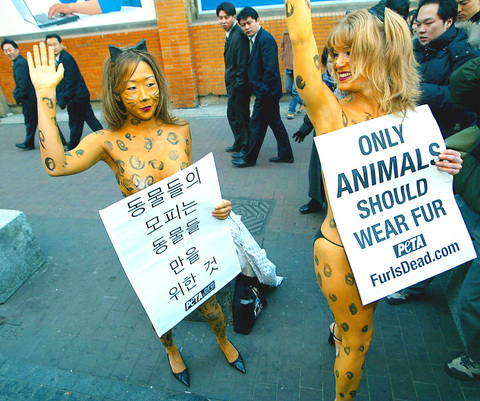Sultry animal rights activists stripped down in the freezing weather to bare their skin on Friday to try to save the hides of millions of animals slaughtered for fur garments.
Wearing nothing more than flimsy underwear, painted-on leopard spots, cat's ears and carrying a banner reading "Only Animals Should Wear Fur," two young women from the People for the Ethical Treatment of Animals (PETA) marched down the street at the busy commercial block of Myeongdong.

PHOTO: REUTERS
A crowd of curious, mostly male onlookers feasted their eyes on the activists who braved the numbing winter weather to show their skins and shout slogans.
But several plainclothes policemen quickly forced their way through the group, wrapped the two naked women with blankets and overcoats and dragged them to a nearby police station.
The two were then charged with "indecent exposure" and ordered to appear before court where they will likely be fined, said Lisa Franzetta, one of the two protestors and the coordinator of PETA's international "Anti-Fur" Campaign.
"People just need to know if they are buying fur coats ... that animal was either electrocuted, or poisoned or had their neck broken simply for the sake of fashion," she said.
"We know when the Korean people become more aware of the really incredible suffering and violence behind the fur industry, they will reject fur. That's why we were out there showing some of our own skin today in the hopes that it will help save the skins of the millions of animals," she said.
Traditionally, North America, Western Europe, the Nordic countries and Russia have been the major markets for fur garments.
But because of the declining fur industry's desperate efforts to create new markets, sales of furs have expanded to South Korea, China and Japan, PETA said.
"With today's toasty and fashionable synthetics, there's no excuse to wear fur," said Christina Cho, who took part in the protest with Franzetta.
Sales of fur garments in South Korea had been increasing until the economy fell into a slump in 2003. At that time annual sales were roughly estimated at US$400 million.
"Differently from those in Europe, clients in South Korea are not affected much by anti-fur campaigns as the winter here is too cold to reject fur coats," said Han Sang-hoon, a manager of Jindo Corp, a leading fur coat maker in Seoul.
South Korea was the last leg of PETA's Asian campaign which also took the activists to Japan and China.
"This is the first anti-fur protest in South Korea but certainly it won't be the last," Franzetta said.
Meanwhile, South Korea's deputy prime minister in charge of education stepped down on Friday amid allegations of unethical conduct after serving in his post for only three days.
Civic groups have accused Lee Ki-jun, a former president of Seoul National University, of spending school funds improperly and hiding real estate assets under his son's name.
``I think the problems surrounding me are causing too big a burden for the president and people,'' Lee said in a statement he read before reporters. He didn't take questions.
Lee was appointed by President Roh Moo-hyun on Tuesday, and took office the following day.
There was no immediate comment from Roh's office, which faced criticism that it failed to review Lee's record thoroughly before his appointment.

Packed crowds in India celebrating their cricket team’s victory ended in a deadly stampede on Wednesday, with 11 mainly young fans crushed to death, the local state’s chief minister said. Joyous cricket fans had come out to celebrate and welcome home their heroes, Royal Challengers Bengaluru, after they beat Punjab Kings in a roller-coaster Indian Premier League (IPL) cricket final on Tuesday night. However, the euphoria of the vast crowds in the southern tech city of Bengaluru ended in disaster, with Indian Prime Minister Narendra calling it “absolutely heartrending.” Karnataka Chief Minister Siddaramaiah said most of the deceased are young, with 11 dead

By 2027, Denmark would relocate its foreign convicts to a prison in Kosovo under a 200-million-euro (US$228.6 million) agreement that has raised concerns among non-governmental organizations (NGOs) and residents, but which could serve as a model for the rest of the EU. The agreement, reached in 2022 and ratified by Kosovar lawmakers last year, provides for the reception of up to 300 foreign prisoners sentenced in Denmark. They must not have been convicted of terrorism or war crimes, or have a mental condition or terminal disease. Once their sentence is completed in Kosovan, they would be deported to their home country. In

Brazil, the world’s largest Roman Catholic country, saw its Catholic population decline further in 2022, while evangelical Christians and those with no religion continued to rise, census data released on Friday by the Brazilian Institute of Geography and Statistics (IBGE) showed. The census indicated that Brazil had 100.2 million Roman Catholics in 2022, accounting for 56.7 percent of the population, down from 65.1 percent or 105.4 million recorded in the 2010 census. Meanwhile, the share of evangelical Christians rose to 26.9 percent last year, up from 21.6 percent in 2010, adding 12 million followers to reach 47.4 million — the highest figure

LOST CONTACT: The mission carried payloads from Japan, the US and Taiwan’s National Central University, including a deep space radiation probe, ispace said Japanese company ispace said its uncrewed moon lander likely crashed onto the moon’s surface during its lunar touchdown attempt yesterday, marking another failure two years after its unsuccessful inaugural mission. Tokyo-based ispace had hoped to join US firms Intuitive Machines and Firefly Aerospace as companies that have accomplished commercial landings amid a global race for the moon, which includes state-run missions from China and India. A successful mission would have made ispace the first company outside the US to achieve a moon landing. Resilience, ispace’s second lunar lander, could not decelerate fast enough as it approached the moon, and the company has